Healthcare Finance Fraud: Compliance, Cases, and Consequences Report
VerifiedAdded on 2022/09/02
|6
|1425
|15
Report
AI Summary
This report delves into the critical aspects of healthcare finance fraud and compliance programs. It highlights the importance of ethical conduct and adherence to regulations within healthcare organizations. The report begins by defining compliance programs and their role in preventing fraud, inaccurate billing, and ethical violations. It then presents real-world cases of healthcare fraud, including instances involving physicians in Las Vegas and Illinois, detailing the fraudulent activities and financial repercussions. The report further examines the consequences faced by healthcare organizations for fraud, emphasizing the relevant federal laws like the False Claims Act and the Anti-Kickback Statute, and the penalties imposed by government agencies. The conclusion underscores the need for robust compliance programs and employee education to deter fraudulent actions, promote ethical behavior, and ensure the delivery of quality healthcare services. The report references various sources, including research papers and government publications, to support its findings and recommendations.
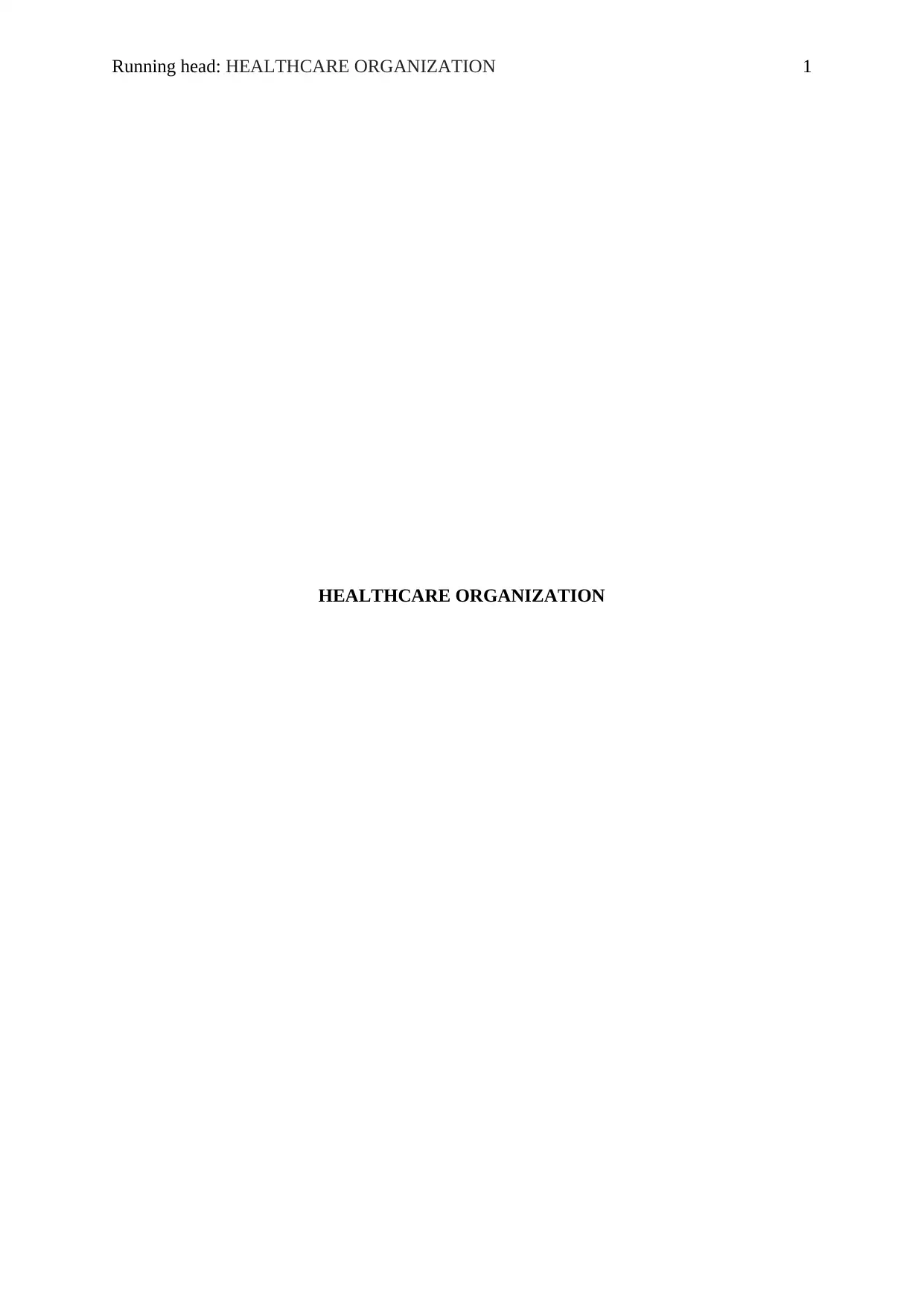
Running head: HEALTHCARE ORGANIZATION 1
HEALTHCARE ORGANIZATION
HEALTHCARE ORGANIZATION
Paraphrase This Document
Need a fresh take? Get an instant paraphrase of this document with our AI Paraphraser
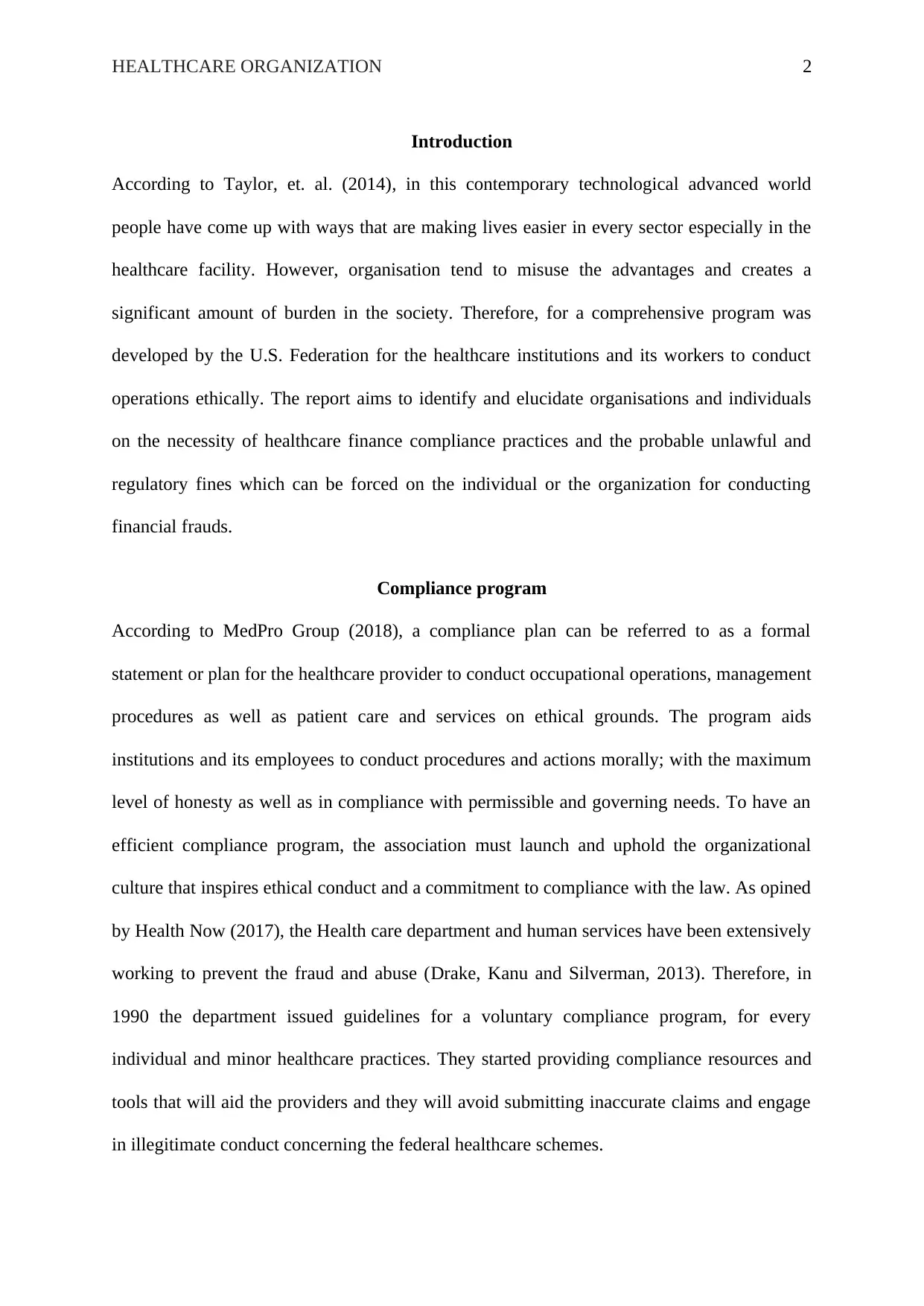
HEALTHCARE ORGANIZATION 2
Introduction
According to Taylor, et. al. (2014), in this contemporary technological advanced world
people have come up with ways that are making lives easier in every sector especially in the
healthcare facility. However, organisation tend to misuse the advantages and creates a
significant amount of burden in the society. Therefore, for a comprehensive program was
developed by the U.S. Federation for the healthcare institutions and its workers to conduct
operations ethically. The report aims to identify and elucidate organisations and individuals
on the necessity of healthcare finance compliance practices and the probable unlawful and
regulatory fines which can be forced on the individual or the organization for conducting
financial frauds.
Compliance program
According to MedPro Group (2018), a compliance plan can be referred to as a formal
statement or plan for the healthcare provider to conduct occupational operations, management
procedures as well as patient care and services on ethical grounds. The program aids
institutions and its employees to conduct procedures and actions morally; with the maximum
level of honesty as well as in compliance with permissible and governing needs. To have an
efficient compliance program, the association must launch and uphold the organizational
culture that inspires ethical conduct and a commitment to compliance with the law. As opined
by Health Now (2017), the Health care department and human services have been extensively
working to prevent the fraud and abuse (Drake, Kanu and Silverman, 2013). Therefore, in
1990 the department issued guidelines for a voluntary compliance program, for every
individual and minor healthcare practices. They started providing compliance resources and
tools that will aid the providers and they will avoid submitting inaccurate claims and engage
in illegitimate conduct concerning the federal healthcare schemes.
Introduction
According to Taylor, et. al. (2014), in this contemporary technological advanced world
people have come up with ways that are making lives easier in every sector especially in the
healthcare facility. However, organisation tend to misuse the advantages and creates a
significant amount of burden in the society. Therefore, for a comprehensive program was
developed by the U.S. Federation for the healthcare institutions and its workers to conduct
operations ethically. The report aims to identify and elucidate organisations and individuals
on the necessity of healthcare finance compliance practices and the probable unlawful and
regulatory fines which can be forced on the individual or the organization for conducting
financial frauds.
Compliance program
According to MedPro Group (2018), a compliance plan can be referred to as a formal
statement or plan for the healthcare provider to conduct occupational operations, management
procedures as well as patient care and services on ethical grounds. The program aids
institutions and its employees to conduct procedures and actions morally; with the maximum
level of honesty as well as in compliance with permissible and governing needs. To have an
efficient compliance program, the association must launch and uphold the organizational
culture that inspires ethical conduct and a commitment to compliance with the law. As opined
by Health Now (2017), the Health care department and human services have been extensively
working to prevent the fraud and abuse (Drake, Kanu and Silverman, 2013). Therefore, in
1990 the department issued guidelines for a voluntary compliance program, for every
individual and minor healthcare practices. They started providing compliance resources and
tools that will aid the providers and they will avoid submitting inaccurate claims and engage
in illegitimate conduct concerning the federal healthcare schemes.
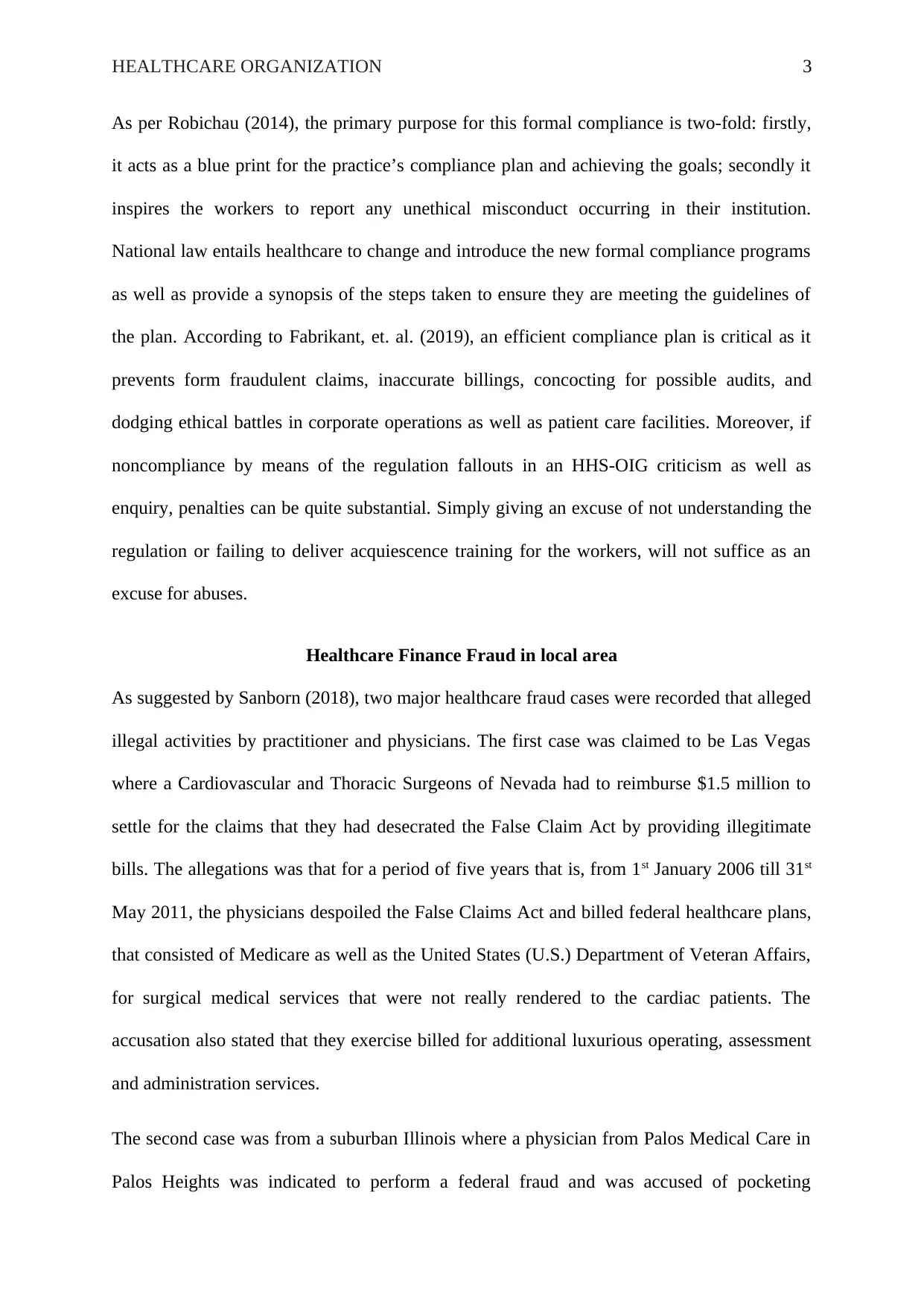
HEALTHCARE ORGANIZATION 3
As per Robichau (2014), the primary purpose for this formal compliance is two-fold: firstly,
it acts as a blue print for the practice’s compliance plan and achieving the goals; secondly it
inspires the workers to report any unethical misconduct occurring in their institution.
National law entails healthcare to change and introduce the new formal compliance programs
as well as provide a synopsis of the steps taken to ensure they are meeting the guidelines of
the plan. According to Fabrikant, et. al. (2019), an efficient compliance plan is critical as it
prevents form fraudulent claims, inaccurate billings, concocting for possible audits, and
dodging ethical battles in corporate operations as well as patient care facilities. Moreover, if
noncompliance by means of the regulation fallouts in an HHS-OIG criticism as well as
enquiry, penalties can be quite substantial. Simply giving an excuse of not understanding the
regulation or failing to deliver acquiescence training for the workers, will not suffice as an
excuse for abuses.
Healthcare Finance Fraud in local area
As suggested by Sanborn (2018), two major healthcare fraud cases were recorded that alleged
illegal activities by practitioner and physicians. The first case was claimed to be Las Vegas
where a Cardiovascular and Thoracic Surgeons of Nevada had to reimburse $1.5 million to
settle for the claims that they had desecrated the False Claim Act by providing illegitimate
bills. The allegations was that for a period of five years that is, from 1st January 2006 till 31st
May 2011, the physicians despoiled the False Claims Act and billed federal healthcare plans,
that consisted of Medicare as well as the United States (U.S.) Department of Veteran Affairs,
for surgical medical services that were not really rendered to the cardiac patients. The
accusation also stated that they exercise billed for additional luxurious operating, assessment
and administration services.
The second case was from a suburban Illinois where a physician from Palos Medical Care in
Palos Heights was indicated to perform a federal fraud and was accused of pocketing
As per Robichau (2014), the primary purpose for this formal compliance is two-fold: firstly,
it acts as a blue print for the practice’s compliance plan and achieving the goals; secondly it
inspires the workers to report any unethical misconduct occurring in their institution.
National law entails healthcare to change and introduce the new formal compliance programs
as well as provide a synopsis of the steps taken to ensure they are meeting the guidelines of
the plan. According to Fabrikant, et. al. (2019), an efficient compliance plan is critical as it
prevents form fraudulent claims, inaccurate billings, concocting for possible audits, and
dodging ethical battles in corporate operations as well as patient care facilities. Moreover, if
noncompliance by means of the regulation fallouts in an HHS-OIG criticism as well as
enquiry, penalties can be quite substantial. Simply giving an excuse of not understanding the
regulation or failing to deliver acquiescence training for the workers, will not suffice as an
excuse for abuses.
Healthcare Finance Fraud in local area
As suggested by Sanborn (2018), two major healthcare fraud cases were recorded that alleged
illegal activities by practitioner and physicians. The first case was claimed to be Las Vegas
where a Cardiovascular and Thoracic Surgeons of Nevada had to reimburse $1.5 million to
settle for the claims that they had desecrated the False Claim Act by providing illegitimate
bills. The allegations was that for a period of five years that is, from 1st January 2006 till 31st
May 2011, the physicians despoiled the False Claims Act and billed federal healthcare plans,
that consisted of Medicare as well as the United States (U.S.) Department of Veteran Affairs,
for surgical medical services that were not really rendered to the cardiac patients. The
accusation also stated that they exercise billed for additional luxurious operating, assessment
and administration services.
The second case was from a suburban Illinois where a physician from Palos Medical Care in
Palos Heights was indicated to perform a federal fraud and was accused of pocketing
⊘ This is a preview!⊘
Do you want full access?
Subscribe today to unlock all pages.

Trusted by 1+ million students worldwide
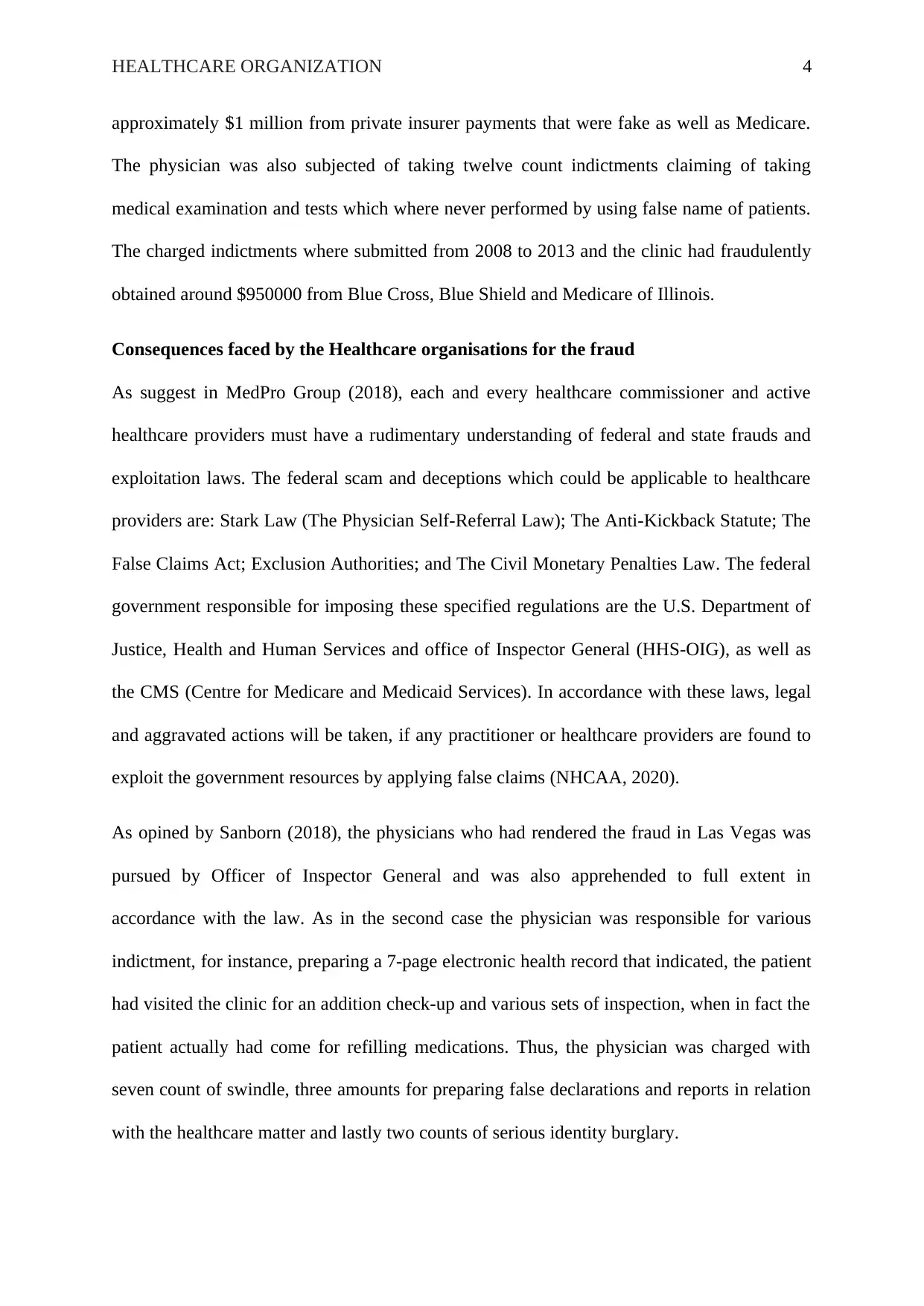
HEALTHCARE ORGANIZATION 4
approximately $1 million from private insurer payments that were fake as well as Medicare.
The physician was also subjected of taking twelve count indictments claiming of taking
medical examination and tests which where never performed by using false name of patients.
The charged indictments where submitted from 2008 to 2013 and the clinic had fraudulently
obtained around $950000 from Blue Cross, Blue Shield and Medicare of Illinois.
Consequences faced by the Healthcare organisations for the fraud
As suggest in MedPro Group (2018), each and every healthcare commissioner and active
healthcare providers must have a rudimentary understanding of federal and state frauds and
exploitation laws. The federal scam and deceptions which could be applicable to healthcare
providers are: Stark Law (The Physician Self-Referral Law); The Anti-Kickback Statute; The
False Claims Act; Exclusion Authorities; and The Civil Monetary Penalties Law. The federal
government responsible for imposing these specified regulations are the U.S. Department of
Justice, Health and Human Services and office of Inspector General (HHS-OIG), as well as
the CMS (Centre for Medicare and Medicaid Services). In accordance with these laws, legal
and aggravated actions will be taken, if any practitioner or healthcare providers are found to
exploit the government resources by applying false claims (NHCAA, 2020).
As opined by Sanborn (2018), the physicians who had rendered the fraud in Las Vegas was
pursued by Officer of Inspector General and was also apprehended to full extent in
accordance with the law. As in the second case the physician was responsible for various
indictment, for instance, preparing a 7-page electronic health record that indicated, the patient
had visited the clinic for an addition check-up and various sets of inspection, when in fact the
patient actually had come for refilling medications. Thus, the physician was charged with
seven count of swindle, three amounts for preparing false declarations and reports in relation
with the healthcare matter and lastly two counts of serious identity burglary.
approximately $1 million from private insurer payments that were fake as well as Medicare.
The physician was also subjected of taking twelve count indictments claiming of taking
medical examination and tests which where never performed by using false name of patients.
The charged indictments where submitted from 2008 to 2013 and the clinic had fraudulently
obtained around $950000 from Blue Cross, Blue Shield and Medicare of Illinois.
Consequences faced by the Healthcare organisations for the fraud
As suggest in MedPro Group (2018), each and every healthcare commissioner and active
healthcare providers must have a rudimentary understanding of federal and state frauds and
exploitation laws. The federal scam and deceptions which could be applicable to healthcare
providers are: Stark Law (The Physician Self-Referral Law); The Anti-Kickback Statute; The
False Claims Act; Exclusion Authorities; and The Civil Monetary Penalties Law. The federal
government responsible for imposing these specified regulations are the U.S. Department of
Justice, Health and Human Services and office of Inspector General (HHS-OIG), as well as
the CMS (Centre for Medicare and Medicaid Services). In accordance with these laws, legal
and aggravated actions will be taken, if any practitioner or healthcare providers are found to
exploit the government resources by applying false claims (NHCAA, 2020).
As opined by Sanborn (2018), the physicians who had rendered the fraud in Las Vegas was
pursued by Officer of Inspector General and was also apprehended to full extent in
accordance with the law. As in the second case the physician was responsible for various
indictment, for instance, preparing a 7-page electronic health record that indicated, the patient
had visited the clinic for an addition check-up and various sets of inspection, when in fact the
patient actually had come for refilling medications. Thus, the physician was charged with
seven count of swindle, three amounts for preparing false declarations and reports in relation
with the healthcare matter and lastly two counts of serious identity burglary.
Paraphrase This Document
Need a fresh take? Get an instant paraphrase of this document with our AI Paraphraser
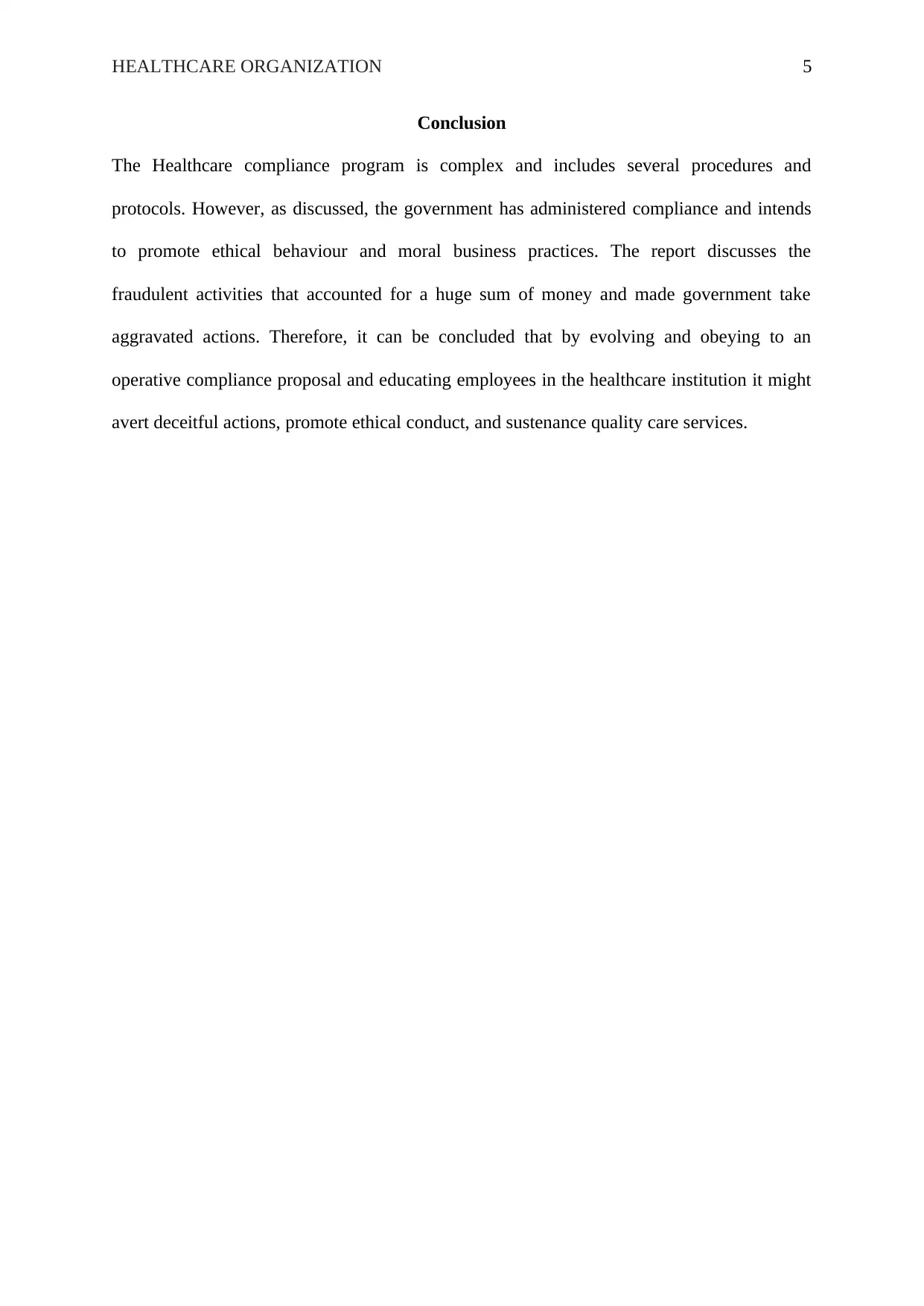
HEALTHCARE ORGANIZATION 5
Conclusion
The Healthcare compliance program is complex and includes several procedures and
protocols. However, as discussed, the government has administered compliance and intends
to promote ethical behaviour and moral business practices. The report discusses the
fraudulent activities that accounted for a huge sum of money and made government take
aggravated actions. Therefore, it can be concluded that by evolving and obeying to an
operative compliance proposal and educating employees in the healthcare institution it might
avert deceitful actions, promote ethical conduct, and sustenance quality care services.
Conclusion
The Healthcare compliance program is complex and includes several procedures and
protocols. However, as discussed, the government has administered compliance and intends
to promote ethical behaviour and moral business practices. The report discusses the
fraudulent activities that accounted for a huge sum of money and made government take
aggravated actions. Therefore, it can be concluded that by evolving and obeying to an
operative compliance proposal and educating employees in the healthcare institution it might
avert deceitful actions, promote ethical conduct, and sustenance quality care services.
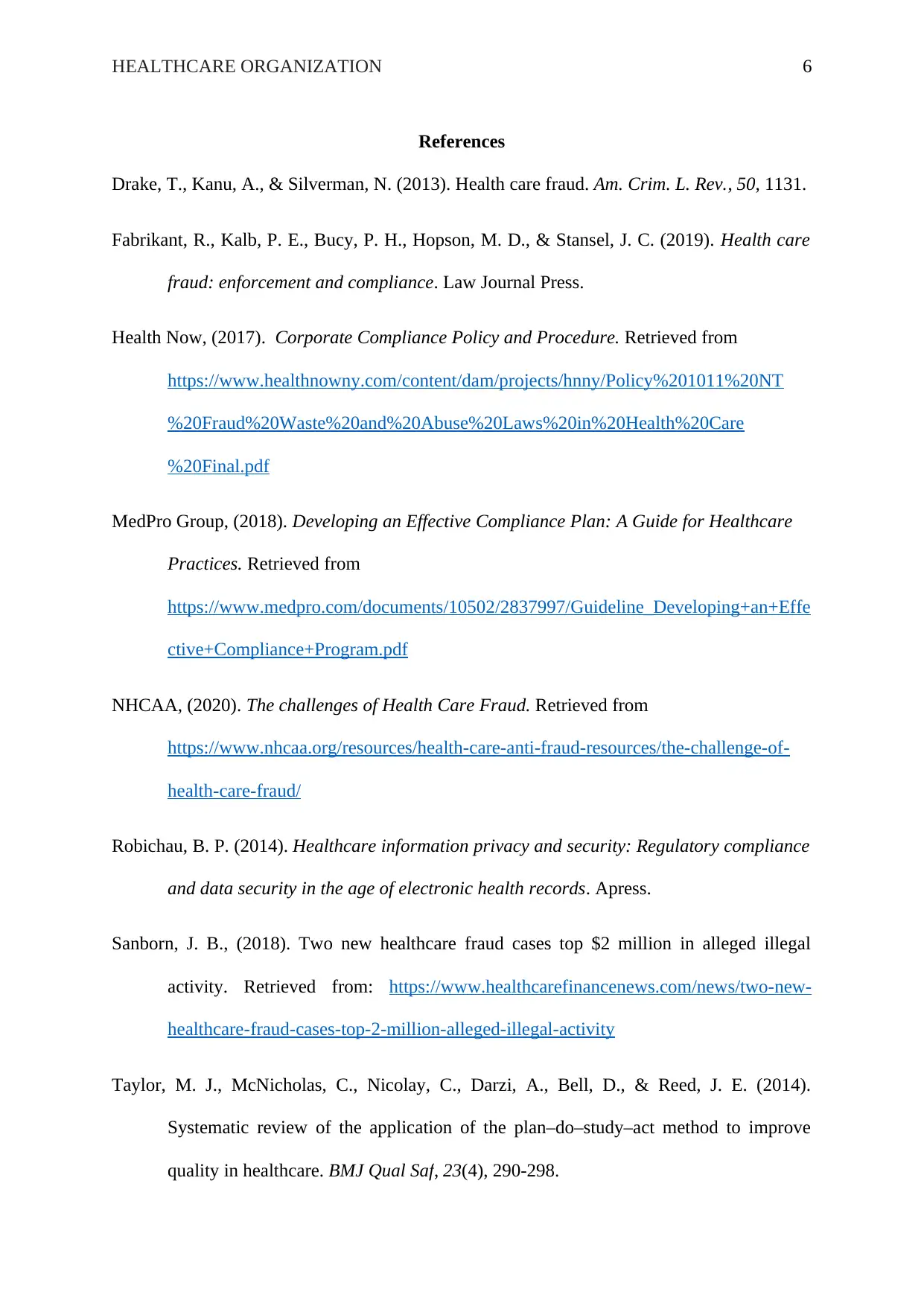
HEALTHCARE ORGANIZATION 6
References
Drake, T., Kanu, A., & Silverman, N. (2013). Health care fraud. Am. Crim. L. Rev., 50, 1131.
Fabrikant, R., Kalb, P. E., Bucy, P. H., Hopson, M. D., & Stansel, J. C. (2019). Health care
fraud: enforcement and compliance. Law Journal Press.
Health Now, (2017). Corporate Compliance Policy and Procedure. Retrieved from
https://www.healthnowny.com/content/dam/projects/hnny/Policy%201011%20NT
%20Fraud%20Waste%20and%20Abuse%20Laws%20in%20Health%20Care
%20Final.pdf
MedPro Group, (2018). Developing an Effective Compliance Plan: A Guide for Healthcare
Practices. Retrieved from
https://www.medpro.com/documents/10502/2837997/Guideline_Developing+an+Effe
ctive+Compliance+Program.pdf
NHCAA, (2020). The challenges of Health Care Fraud. Retrieved from
https://www.nhcaa.org/resources/health-care-anti-fraud-resources/the-challenge-of-
health-care-fraud/
Robichau, B. P. (2014). Healthcare information privacy and security: Regulatory compliance
and data security in the age of electronic health records. Apress.
Sanborn, J. B., (2018). Two new healthcare fraud cases top $2 million in alleged illegal
activity. Retrieved from: https://www.healthcarefinancenews.com/news/two-new-
healthcare-fraud-cases-top-2-million-alleged-illegal-activity
Taylor, M. J., McNicholas, C., Nicolay, C., Darzi, A., Bell, D., & Reed, J. E. (2014).
Systematic review of the application of the plan–do–study–act method to improve
quality in healthcare. BMJ Qual Saf, 23(4), 290-298.
References
Drake, T., Kanu, A., & Silverman, N. (2013). Health care fraud. Am. Crim. L. Rev., 50, 1131.
Fabrikant, R., Kalb, P. E., Bucy, P. H., Hopson, M. D., & Stansel, J. C. (2019). Health care
fraud: enforcement and compliance. Law Journal Press.
Health Now, (2017). Corporate Compliance Policy and Procedure. Retrieved from
https://www.healthnowny.com/content/dam/projects/hnny/Policy%201011%20NT
%20Fraud%20Waste%20and%20Abuse%20Laws%20in%20Health%20Care
%20Final.pdf
MedPro Group, (2018). Developing an Effective Compliance Plan: A Guide for Healthcare
Practices. Retrieved from
https://www.medpro.com/documents/10502/2837997/Guideline_Developing+an+Effe
ctive+Compliance+Program.pdf
NHCAA, (2020). The challenges of Health Care Fraud. Retrieved from
https://www.nhcaa.org/resources/health-care-anti-fraud-resources/the-challenge-of-
health-care-fraud/
Robichau, B. P. (2014). Healthcare information privacy and security: Regulatory compliance
and data security in the age of electronic health records. Apress.
Sanborn, J. B., (2018). Two new healthcare fraud cases top $2 million in alleged illegal
activity. Retrieved from: https://www.healthcarefinancenews.com/news/two-new-
healthcare-fraud-cases-top-2-million-alleged-illegal-activity
Taylor, M. J., McNicholas, C., Nicolay, C., Darzi, A., Bell, D., & Reed, J. E. (2014).
Systematic review of the application of the plan–do–study–act method to improve
quality in healthcare. BMJ Qual Saf, 23(4), 290-298.
⊘ This is a preview!⊘
Do you want full access?
Subscribe today to unlock all pages.

Trusted by 1+ million students worldwide
1 out of 6
Related Documents
Your All-in-One AI-Powered Toolkit for Academic Success.
+13062052269
info@desklib.com
Available 24*7 on WhatsApp / Email
![[object Object]](/_next/static/media/star-bottom.7253800d.svg)
Unlock your academic potential
Copyright © 2020–2025 A2Z Services. All Rights Reserved. Developed and managed by ZUCOL.




